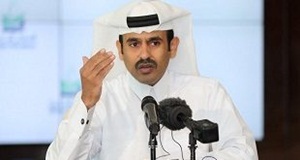Qatar, the smallest oil producer among the Organisation of Petroleum Exporting Countries (Opec), on Monday announced plans to quit the producer cartel in January and pursue its own independent policies outside the grouping, to establish its position as the world’s top exporter of natural gas.

“Qatar has decided to withdraw its membership from Opec effective January 2019 and this decision was communicated to Opec this morning,” Qatar’s minister of state for energy affairs Saad al-Kaabi told a news conference on Monday.
“For me to put efforts and resources and time in an organisation that we are a very small player in and I don't have a say in what happens...practically it does not work, so for us it's better to focus on our big growth potential,” Al-Kaabi said.
Qatar, the world’s largest exporter of liquified natural gas, plans to increase its exports from 77 million tons of gas per year to 110 million tonnes, he said, adding that Qatar also wants to raise its oil production from 4.8 million barrels of oil equivalent a day to 6.5 million barrels.
“In light of such efforts and plans, and in our pursuit to strengthen Qatar’s position as a reliable and trustworthy energy supplier across the globe, we had to take steps to review Qatar’s role and contributions on the international energy scene,” al-Kaabi stated.
Qatar, which is locked in a diplomatic dispute with the group's de-facto leader Saudi Arabia, said the move to exit Opec was not linked to the economic boycott of Doha imposed by some members of the Gulf Co-operation Council (GCC).
Although Qatar cannot claim to be a major oil producer, the country has been a member of Opec since inception 57 years ago and have played a major role as a member of the oil cartel.
Qatar discovered the offshore North Field in 1971, the same year it became independent. But its oil output is only 600,000 barrels per day (bpd), compared with the 11 million bpd produced by Saudi Arabia. Doha, however, continues to be a major player in the global LNG market with annual production of 77 million tonnes per year.
Qatar, a country of 2.6 million people with its citizens accounting for just 10 per cent of it, is facing an economic and political boycott from Opec members, Saudi Arabia and the United Arab Emirates, and fellow Arab states Bahrain and Egypt, since June 2017. The Gulf neighbours have accused the country of supporting terrorism, but Doha denies the charges.
Al-Kaabi said Qatar would abide by its commitments as a member of the cartel and would attend the group's meeting on Thursday and Friday this week.
The surprise announcement by Qatar cold further strain the Opec, which is being drawn apart by diverse forces and interests. The waning clout of the cartel was evident when Saudi Arabia sought Russian support to steady oil prices that have hit rock bottom in 2016.
Opec and other oil producers, including Russia, are expected to agree on a supply cut at this week's meeting in a bid to support crude prices that have slid almost 30 per cent since October.




















